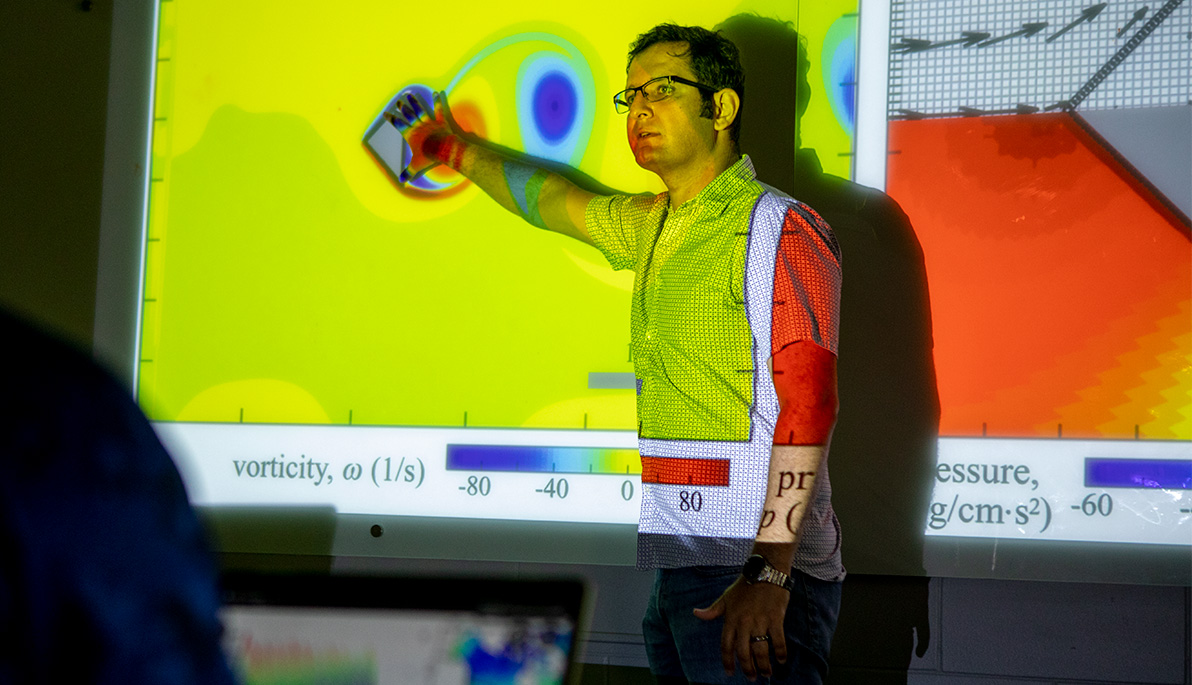
Pejman Sanaei, Ph.D., Will Use Math to Improve Membrane Filter Performance
September 9, 2021
“Just do the math” will take on a whole new meaning when Assistant Professor of Mathematics Pejman Sanaei, Ph.D., uses a $204,085 National Science Foundation (NSF) grant with the goal of improving and optimizing membrane filter performance and manufacturing costs.
Membrane filters have myriad and widespread uses, ranging from water treatment and reducing bacteria in dairy products to removing impurities from the blood in kidney dialysis to beer clarification, among others. According to Market Watch, the global membrane filtration market was estimated at $5.43 billion in 2020 and is expected to reach $8.76 billion by the end of 2026.
Driving this surge is the demand for improvements to water regulations and for premium products across many industries. As such, manufacturers are seeking to improve the quality of their products, which often increases manufacturing costs.
As Principal Investigator, Sanaei will engage a team of New York Tech undergraduate students to study the performance of membrane filters using mathematical models and simulations. The research aims to formulate and analyze novel mathematical models to investigate how membrane filters with complex internal structures change, over time resulting in poor filtration. With his findings, Sanaei hopes to offer manufacturers solutions to improve their product while reducing the cost of production.
Filter performance depends on key features of the porous membrane key features (used for microfiltration and ultrafiltration), including membrane thickness, internal pore structure and shape, pore connectivity, and variation of pore dimensions inside the membrane. “The complexity of the coupling between the membrane morphology, which evolves dynamically during the filtration process, and the details of the particle-laden flow, make filtration and deposits a challenging predictive modeling problem,” Sanaei explains. In other words, flow can include unwanted particles, and those particles are diluted in the flow, making it difficult to predict how membranes will change their shape and function.
“Think of a coffee or water filter. As flow passes through the membranes or porous materials, the unwanted particles or contaminants will be trapped inside the membrane and deposited there,” says Sanaei. “As a consequence, the internal structure of the membrane changes, meaning that the void (empty) area decreases. This is called co-evolution of membrane internal structure.”
In each year of the three-year project, Sanaei and his team of students will create models for random effects of particle dynamics and variations in the internal membrane structure. They will then compare these models to observations, experiments, and data from filter manufacturers to understand the co-evolution of membrane internal structure and flow with respect to porous materials and membrane filters.
The New York Tech undergraduate students involved in the first year are electrical and computer engineering students Dave Persaud and Mikhail Smirnov, who is minoring in mathematics, as well as one student from Bronx High School of Science. They have already begun work on the project, including giving more than 20 talks and presentations on their discoveries at the American Physical Society Division of Fluid Dynamics (APS-DFD) in November 2020, Society of Industrial Applied Mathematics (SIAM) in July 2021, and other national conferences. Sanaei plans to recruit more undergraduates to participate in the research, including women and other underrepresented minorities in the mathematical and physical sciences.
The NSF is an independent agency of the U.S. government that supports fundamental research and education in all the non-medical fields of science and engineering. Its medical counterpart is the National Institutes of Health. NSF funding accounts for approximately 27 percent of the total federal budget for basic research conducted at U.S. colleges and universities.
This project is funded by NSF Award ID No. 2045466. The content is solely the responsibility of the authors and does not necessarily represent the official views of the NSF.
More Features

An Alumnus’ Commitment to the Environment
As an energy management graduate from New York Tech’s Vancouver campus, Jasdeep Gulati (M.S. ’22) is highly invested in educating people about environmental and climate sustainability.

Vancouver Faculty Win University-Sponsored Research Awards in New Program
The new Global Impact Research Grant (GIRG) program has been developed to keep Vancouver-based faculty connected to faculty and research projects being conducted on the university’s New York campuses.

Studying Climate Change One Degree at a Time
Junhua Qu (M.S. ’24) began her collegiate journey in Beijing. But, her interest in climate change took her to New York Tech’s Vancouver campus to study energy management.
